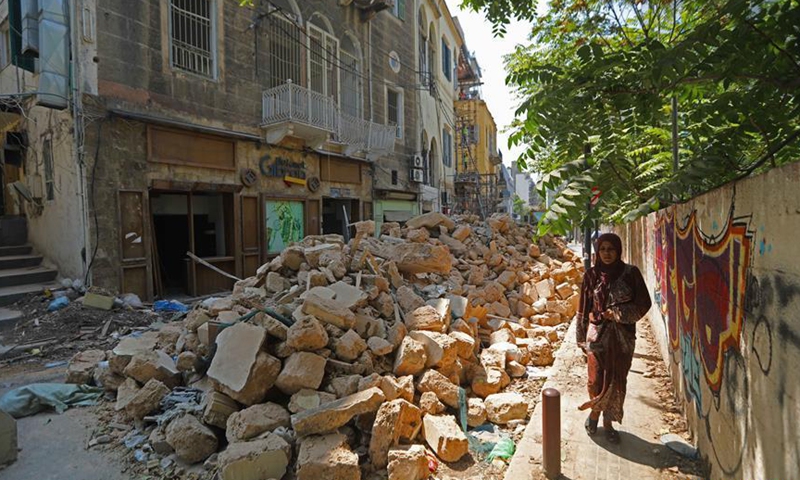Half of Lebanese risk facing food shortages in aftermath of blast: UN
Source: AFP Published: 2020/8/31 16:48:41

A woman walks past damaged buildings in Beirut, Lebanon, Aug. 29, 2020. Two huge explosions rocked Port of Beirut on Aug. 4, shaking buildings all over Lebanon's capital. The death toll from the explosions reached 190 while the number of injuries exceeded 6,500 with three people still missing, LBCI local TV channel reported. (Xinhua/Bilal Jawich)
More than half of Lebanese risk facing a food crisis in the aftermath of a Beirut port blast that compounded Lebanon's many woes, a UN agency said Sunday."More than half of the country's population is at risk of failing to access their basic food needs by the year's end," the UN Economic and Social Commission for Western Asia (ESCWA) said.
"Immediate measures should be taken to prevent a food crisis," ESCWA executive secretary Rola Dashti said.
Lebanon's government, she said, must prioritize the rebuilding of silos at the Beirut port, the country's largest grain storage.
Lebanon was mired in an economic collapse even before the cataclysmic August 4 blast at Beirut's port, which killed 188 people, wounded thousands and destroyed swathes of the capital.
Lebanon defaulted on its debt, while the local currency has plummeted in value on the black market and poverty rates have soared, on top of a spike in the number of coronavirus cases.
"The yearly average inflation rate is expected to be more than 50 percent in 2020, compared with 2.9 percent in 2019," ESCWA said in a statement.
Lebanon relies on imports for 85 percent of its food needs and the annihilation of the silos at the Beirut port could worsen an already alarming situation, aid agencies and experts have said.
ESCWA said increased transaction costs of food imports could lead to a further rise in prices.
To prevent a crisis, authorities must set a ceiling for food prices and encourage direct sales from local producers to consumers, Dashti added.
She also urged the international community to "expand food security programs targeting refugees and host communities" to help defuse "potential social tensions."
ESCWA earlier said more than 55 percent of Lebanese are "trapped in poverty and struggling for bare necessities."
AFP
Posted in: MID-EAST